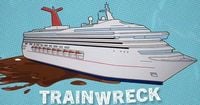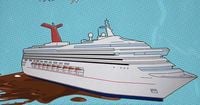In February 2013, what was supposed to be a routine four-day cruise from Galveston, Texas, to Cozumel, Mexico, on the Carnival Triumph morphed into a harrowing ordeal for over 4,000 passengers and crew. A fire in the ship’s engine room crippled its electrical systems, leaving the vessel adrift in the Gulf of Mexico without power, air conditioning, refrigeration, or functioning toilets. This infamous disaster, now known as the "Poop Cruise," has been revisited in the new Netflix documentary Trainwreck: Poop Cruise, which premiered in June 2025 as part of Netflix’s acclaimed Trainwreck series.
The calamity began in the early hours of the cruise’s final day when an "alpha team" alarm jolted passengers awake. Devin Marble, a passenger on board, recalled the panic: "People were running and banging on doors. You could hear the panic. I’m like, ‘Oh my god, this is it. This is the Titanic. We’re going down.’" Though the fire was quickly contained, it had already destroyed the ship’s electrical cables, plunging the Triumph into darkness and chaos.
Without power, the ship’s toilets ceased to function, forcing passengers into unimaginable measures. Cruise director Jen instructed guests to urinate in showers and to use red biohazard bags for defecation. These bags were to be left outside cabins for crew collection, but with thousands aboard, the bins quickly overflowed, and bags piled up in hallways. The stench was suffocating. One chef described entering a bathroom to find what he called a poop "lasagna" — layers of excrement and toilet paper. As days wore on, the ship’s showers stopped draining, leaving waste to accumulate.
Heat compounded the misery. With no air conditioning, cabins became unbearable. Many passengers dragged mattresses onto the deck, creating makeshift "tent cities" with sheets and mattresses for shade and fresh air. Competition for lounge chairs and space led to tensions and occasional fights. Food supplies dwindled to meager rations, often described as "lettuce sandwiches." In an attempt to lift spirits, the crew opened the ship’s bar for free drinks, but the revelry quickly descended into chaos. Passengers urinated overboard and threw red bags off the ship, with one crew member recalling a bag blown back onto someone’s face by the wind. The bar was soon shut down to restore order.
Communication was limited. Carnival controlled the flow of information tightly, with only a single satellite phone available to the crew. The media initially received scant details, but after passengers managed to connect to a passing ship’s Wi-Fi, distress calls flooded social media, prompting a "complete media bloodbath" for Carnival. CNN and other outlets, initially reluctant to cover the story amidst other major news, soon gave it extensive attention.
The ship drifted over 100 nautical miles away from the Mexican coast, forcing a change in destination to Mobile, Alabama, which added three more days to the ordeal. When tugboats finally arrived to tow the Triumph, worsening weather caused the ship to rock violently, spilling raw sewage onto the floors. Devin Marble described walking down hallways hearing "squish, squish, squish, squish" beneath his feet — the grim reality of standing in excrement.
After nearly five days stranded at sea, the Triumph docked in Mobile on February 14, 2013. Passengers disembarked with tears and laughter, some even kissing the ground in relief. Devin recalled the surreal moment: "We were so happy because we could see lights and crowds. We were taking pictures and even put our life jackets on for fun. I will never forget the first thing I saw was Golden Arches. McDonald’s was there handing out Happy Meals – it was brilliant marketing!"
In the aftermath, Carnival issued a full refund, covered transportation expenses, paid passengers $500 each, and offered a free future cruise. The company also invested over $115 million to clean, repair, and refit the ship, which now sails as the Carnival Sunrise. Maritime lawyer Frank Spagnoletti represented many passengers in lawsuits that were eventually settled. Notably, Carnival removed a clause from its ticket contract that previously absolved it from guaranteeing safe passage or sanitary conditions.
Reflecting on the disaster, Devin Marble offered a nuanced perspective: "Everybody was out for themselves, so I chose to take a compassionate approach. I think this type of crisis shows people’s true colours. There were times where we’d see people with multiple plates and just hoped it was because they had kids or elderly family members who couldn’t walk to get food. It was easier for us to try and see the best in people." He also praised the crew, who endured the same conditions and worked tirelessly: "I think that’s pretty incredible – they were basically superheroes."
Director James Ross, who helmed Trainwreck: Poop Cruise, described the documentary as more than just a retelling of a disaster. He emphasized the film’s balance of humor and gravity, capturing the extremes of hedonism and hardship aboard the ship. Ross noted the film’s use of passenger footage and re-enactments to immerse viewers in the chaos, while also highlighting the crew’s grueling 70-hour workweeks.
Ross also revealed that the fire was traced to a preventable fuel leak, a design vulnerability Carnival had knowingly overlooked. The documentary exposes the corporate PR efforts to control the narrative and the eventual public reckoning once passengers’ distress calls went viral.
Despite the horrific conditions, no lives were lost, and the incident served as a catalyst for sweeping safety improvements. Carnival has since invested more than $500 million across its fleet in fire prevention, system redundancies, and enhanced management protocols. The company stated, "We are proud of the fact that since 2013 over 53 million guests have enjoyed safe and memorable vacations with us, and we will continue to operate to these high standards."
While some viewers and passengers question the necessity of revisiting such a grim episode, the documentary has sparked renewed interest in the precariousness of modern travel and human resilience. One passenger, Tay Redford, now a bakery owner, expressed feeling "hurt" by the documentary’s portrayal, underscoring the lasting trauma the event inflicted.
For many, the "Poop Cruise" remains a cautionary tale about the limits of infrastructure and civility when disaster strikes. As Devin Marble and others have shown, even amid the worst conditions, moments of kindness and humor can emerge. Yet, the ordeal has left an indelible mark, with some survivors admitting they have never set foot on a cruise ship since.
Trainwreck: Poop Cruise is streaming now on Netflix, offering a detailed, sometimes shocking, and often humanizing look at one of the most notorious maritime disasters of the 21st century.






